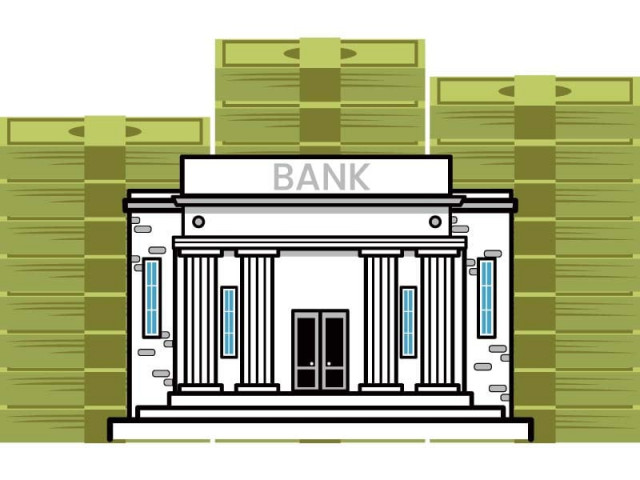Govt to borrow Rs7tr from banks in three months
Rs5.5 trillion to be used to return old maturing debt

The cash-strapped government has planned to pile up debt by a net Rs1.5 trillion in three months (March-May 2023) mainly to make the ever-growing interest payment on debt, finance loss-making State-Owned Entities (SOEs) and pay monthly salaries and pensions among other expenditures.
In gross, the government is targeting to borrow almost Rs7 trillion from commercial banks in the next three months. A big chunk of around Rs5.5 trillion will be used to return old maturing debt. Speaking to The Express Tribune, Arif Habib Limited Head of Research, Tahir Abbas said, “The government’s reliance on domestic debt is on the rise – especially to meet its growing budgeted-expenditure (fiscal deficit) after foreign financing dried up in wait of the International Monetary Fund (IMF)’s programme being revived.
“Debt servicing (interest payment on debt) has become one of the single largest heads of government expenditures,” added Abbas. Global rating agency, Moody’s Investors Service said in late February that “Pakistan has very weak debt affordability (foreign debt in particular). Moody’s estimates that interest payments will increase to around 50% of government revenue in fiscal 2023.”
“The government has budgeted interest payments at Rs3.9 trillion (4.7% of the GDP) for the current fiscal year 2023. It is anticipated to grow to around Rs5.5 trillion (6.5% of the GDP) in the year,” observed Abbas, adding that the aggressive hike of 300bpts in the central bank’s key policy rate in March inflated the size of the interest payment.
“The hike in the policy rate makes bank borrowing expensive,” he said, observing that, “The government itself stands as the single largest borrower from commercial banks.” JS Global Research reported that the government has increased borrowing by 12.5 percentage points in one-year to 85% of the total deposits at commercial banks in January 2023. Apart from making interest payments, Abbas explained that defence spending, subsidies and social spending remain as some of the other big heads raising government expenditure. “The devastating August 2022 floods, and subsequent rehabilitation and reconstruction activities, have taken up a big chunk of government expenditure in the current fiscal year.” He estimated that the fiscal deficit will spike to almost Rs5.8 - Rs6 trillion (7% of the GDP) in the current fiscal year 2023 against the initial target set by the government at Rs3.7 trillion (4.4% of the GDP) for the year.
The government’s requirement for funding has continued to rise despite gradual cuts in subsidies on multiple heads – including the withdrawal of heavy subsidies on petroleum products. Alpha Beta Core, Head of Research, Khurram Schehzad said, “The size of foreign debt grew without increasing the borrowing in the aftermath of the recent and massive rupee devaluation.”
“Every Rs10 depreciation in the domestic currency against the US dollar leads to an addition of Rs1.3 trillion to foreign debt,” he said, adding that though the two measures (hike in policy rate and rupee devaluation) were aimed at creating balance in trade and contain inflation, they indirectly caused a surge in debt and interest payments.
The government has increased debt by Rs7.2 trillion during the July 2022 to January 2023 period to an outstanding amount at Rs55 trillion at present.
The government plans to raise the funds by auctioning debt securities like T-bills and Pakistan Investment Bonds (PIBs) to commercial banks. Earlier, they planned to directly borrow from commercial banks without going into competitive bidding for the sovereign debt instruments to get the required growing funds in a speedy way. The IMF, however, barred the government from doing so under its $6.5 billion loan programme.
Although the government has increased its collection of revenue in taxes, budgeted expenditures remain high despite a massive cut in public sector development programme spending. The State Bank of Pakistan (SBP) said in its latest (March 2023) Monetary Policy statement that, “Recent fiscal adjustments in energy prices, and the austerity drive are expected to help contain the otherwise widening fiscal and primary deficits. The envisaged fiscal consolidation is critical for economic stability and will complement the ongoing monetary tightening in bringing down inflation over the medium-term. Any significant fiscal slippages will undermine monetary policy effectiveness in the context of achieving the price stability objective.”
Debt data breakup:
The SBP said in its auction calendar that the Ministry of Finance will borrow Rs5.5 trillion by selling three, six and 12-month T-bills between March and May 2023.
At the same time, it will return around Rs5.5 trillion to banks against maturing debt in the three months. Apart from that, it has targeted raising another Rs1.02 trillion by selling two to 10-year PIBs to commercial banks in the period. It will borrow another Rs450 billion from Shariah-compliant banking in the three months.
Published in The Express Tribune, March 12th, 2023.
Like Business on Facebook, follow @TribuneBiz on Twitter to stay informed and join in the conversation.



















COMMENTS
Comments are moderated and generally will be posted if they are on-topic and not abusive.
For more information, please see our Comments FAQ